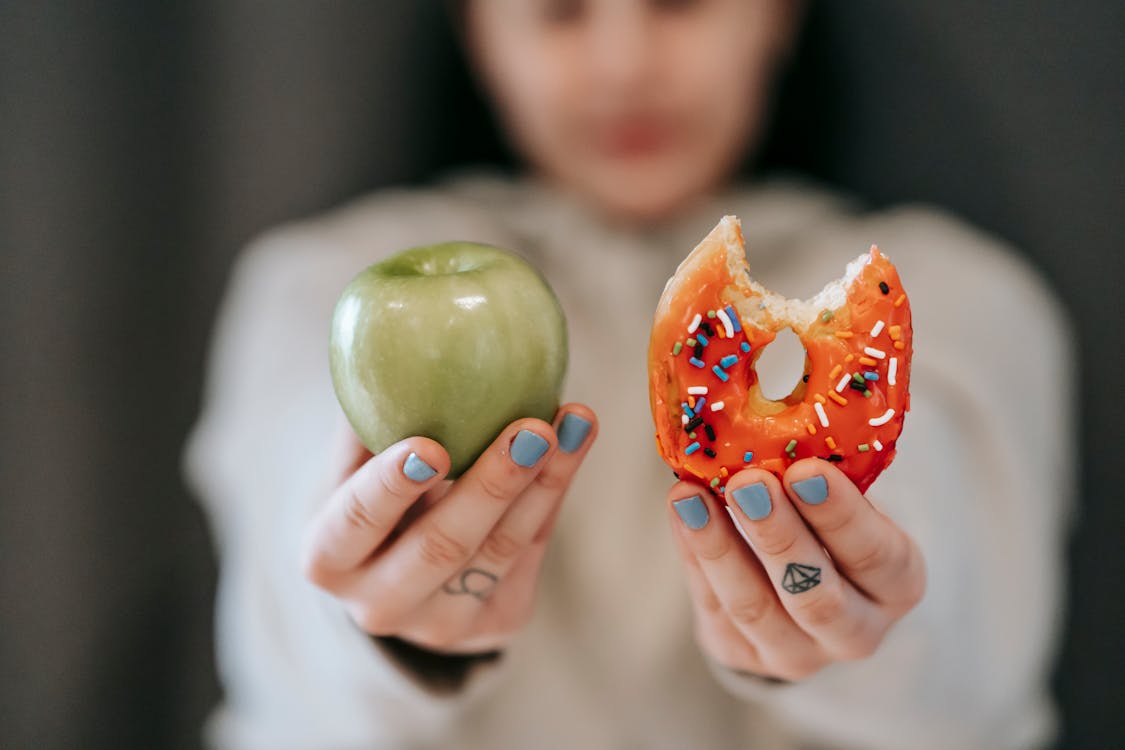Is sugar addiction real—or just another buzzword? If you’ve ever joked that you’re “addicted to sugar” but secretly felt controlled by cravings, you’re not imagining things. From energy crashes to hidden binges, sugar has a powerful pull. And for some, it’s more than just a habit—it’s a pattern that mimics emotional eating and addiction.
In this article, we’ll break down what the science says, how it shows up in real life, and why sugar addiction may actually be a form of emotional dependence. I’ll also point you to our Emotional Eating Probability Quiz to help you uncover what’s really driving your cravings—and what to do next.
As a nutrition specialist working with many people hooked on sugar, I chat with many others that are totally clueless on the subject. Some can see the point in wanting to give your body a break from sugar, but others feel like a world without sugar is unbearably dull.
My response to that is that clearly they either:
- don’t feel they’re hooked on it,
- don’t want to admit it,
- or have no medical need to get off it.

The reason getting off sugar and refined carbs matters is that even if you don’t have a chronic condition you’re trying to manage, or need to lose weight, eating an anti-inflammatory diet will help prevent any of those things from happening. It’s one of the most amazing things you can do for your body to keep inflammation at bay.
That being said, quitting sugar and processed junk food is the very first step in going anti-inflammatory. Many people try to skip this step and go right on into eating an anti-inflammatory diet or jump into an elimination diet.
Neither of these options is possible if you can’t quit eating sugar or refined carbs.
Once I realized this, I strived to make healing my own addiction to sugar and carbs my first order of business on my journey to live an anti-inflammatory lifestyle.
One of the lowest moments of self-loathing in my life was being about 25 pounds overweight, constantly ‘saying’ I wanted to lose weight, but hiding out in the pantry, terrified of being caught, while I shoved cupcake after cupcake in my face because I literally could not control myself.
So if you’re asking me, personally… Hell yes, sugar addiction is real. As a professional? Also Yes.
Laura @ www.true-well.co

If you ask my husband, who’s always been able to just have a bite or two and walk away… well, he doesn’t really know. But he can tell you that he feels that way about potato chips.
As a nutrition specialist with a Master of Science in nutrition under my belt, as well as countless hours doing deep dives into the newest peer-reviewed research on sugar addiction, I can confirm the research supporting ‘food’ being addictive, including sugar.
For some, sugar alone is what will get them. For others it could be the salt, or even the combination of the flavors like fat + sugar, or fat + salt. These combos are called ‘hyper palatable foods’. Food companies have spent billions of dollars figuring this out. And make no mistake: their interests lie in making sure you keep coming back for more.
As a nutritionist and recovered sugar addict (and mom), I get asked this question over and over: Is sugar addiction real? Like really real?
And although the answer has taken many forms over the past several years, my answer to the question is a resounding YES, sugar addiction is really real. And I’ll explain why.
My relationship with sugar started as a kid from the south whose family knew no bounds of cooking with sugar and white flour. This meant dessert after many a meal, and the biggest, sugary-est birthday cakes you’ve ever seen. I loved the sugar and butter combination (or sugar and shortening), and from the time I was a kid, I would always request the piece of cake with the absolute most icing flowers on it.

I never knew the damage all the sugar was doing to my gut bacteria, nor that it could have an effect on my moods, hormones, skin, metabolic markers, and definitely not my neurotransmitters or immune system.
I developed asthma around 12 and had terrible hayfever that I never really shook. By my teen years, I had terrible acne, was constantly irritable, and forever anxious.
It wasn’t until adulthood when I started studying nutrition that I really took a step back and thought through my constant depressive symptoms as a teen and young adult, and put a few pieces together for the ups and downs of my moods, skin, and hormones.
But it wasn’t until after having gestational diabetes for 2 out of 3 pregnancies (type 2 diabetes runs in my family) that I noticed that I felt a thousand percent better when I nixed the sugar.
But quitting sugar wasn’t as easy as just saying ‘no thank you’.
Every birthday and holiday was a struggle. I’ve been in the throes of postpartum depression 3x where I would hide in the pantry to stuff as many cupcakes in secret as I could into my face before anyone could see.

I’ve binged for hours, alternating sugary and salty snacks, in secret when my husband was out of town for work.
And I knew that there was never any circumstance that could keep ‘just one bite’ from turning into 75 bites.
So I can attest first-hand what it feels like to be addicted to sugar. No matter what kind of logic your brain tells you about how crappy you’ll feel the next day (physically and emotionally), that addict part of your brain takes over and mutes the logic.
What Is Sugar Addiction—and Is It Even Real?
Sugar addiction isn’t officially listed as a diagnosable condition, but the behavior patterns it causes look eerily familiar to other forms of substance dependence: cravings, loss of control, tolerance, and withdrawal.
And while the term “addicted” might seem extreme to some, the lived experiences of millions say otherwise. Many people experience symptoms that go far beyond a sweet tooth—including intense urges, binge episodes, and shame afterward.

What’s Your Best Strategy for Eliminating Emotional Eating–for Good?
↓ Take the quiz and find out! ↓
👀 Take the quiz to discover your emotional eating profile and get your personalized strategy—designed to match your current habits, root triggers, and readiness for change.
The Science Behind Sugar Addiction
While in my master’s program we had to do many projects on various topics that all require peer-reviewed studies to support our answers (which is how the medical community and medical organizations formulate their recommendations of things for public health.) Part of the studies I sought out revolved around sugar addiction.
At the time one professor pointed out that the only study supporting sugar addiction thus far involved rats that preferred sugar over cocaine. This boggled me, so I veered on a tangent toward addiction itself to try and get more answers.
Addictive behavior toward substances has these criteria:
- Strong cravings or desire to use a substance
- Failed attempts to quit using the substance or even lessen the frequency
- Using that substance even when you know it’s causing harm
- Tolerance of the substance (you need more to get the same feeling or effect)
- Withdrawal symptoms (if attempts are made to quit using the substance)
At the time I was in my master’s program, the International Classifications of Diseases (one of 2 books used to give diagnostic codes so insurance can decide if they will or will not cover medical services) contained mental health diagnoses for food addiction, but not specifically sugar.
The reasoning was that they, at the time, couldn’t definitively prove that sugar itself was physically addicting, further confusing the ‘Is sugar addiction real?’ question altogether.
I personally have a problem with this, because many people (including myself) have felt the withdrawal symptoms of coming off sugar. These side effects are definitely not imagined, and some have described them as feeling like having a mild case of the flu.
The clincher of sugar is that when consumed, it occupies the same receptors in the brain as drugs like cocaine and heroin. It gives a dopamine hit, which makes you feel good. So it activates those reward systems in the brain and essentially ‘programs’ the brain to want more and make you think you need it.
And once you keep eating it, cravings will start for it.
From that point, it can be very difficult to satisfy the craving and keep yourself from seeking anything to replace it until you completely get off it, and for long enough.
Another thing that happens is that you build tolerance. This is when the brain receptors get a lot of the dopamine hits but eventually adapt and need more to get that reward response. Studies have also proven that the sensation of sweetness builds a tolerance.

There is also evidence of a genetic component to some people feeling addicted to sugar. The gene that controls the dopamine receptors in our brains can have mutations that impair the reward system in the brain, thereby triggering some people to exhibit more addictive behavior toward sugar.
This tends to be one of the hallmarks of a definition of ‘addiction’, but again– the issue is whether it specifically is sugar, or is another component of the food you’re eating, or even a combination of components.
Recently, research has been compiled to compare the criteria of an addictive substance to the proven addictive traits of sugar.

According to the Diagnostic and Statistical Manual of Mental Disorders (DSM), two of the eleven criteria must be met by a patient for that patient to qualify as addicted to a substance. The study done proves that five criteria of addiction to sugar could be met, exceeding the minimum criteria.
How to Break the Sugar Addiction
Without a proper understanding of the truly addictive nature of sugar, many people are at a loss as to how to break their sugar addiction.
Many have tried dieting and quitting cold turkey over and over again, to no avail.
Experience with myself and clients through the years has shown that there are many different factors at play, including:
- genetics,
- how much sugar (and refined carbs) are consumed on a normal basis,
- and for how long.
A popular term that comes up in searches and circulating in ‘wellness’ media is a “sugar detox“. While many may think this concept is a godsend to those trying to quit sugar, it may do more harm than good to those truly addicted.
The reason is that some people can do a sugar detox and are done with sugar, no problem. Those of us that truly have that addictive component to sugar usually can’t manage longer than a week on a sugar detox.
This is where an addiction to sugar (and carbs) veers into what is actually emotional eating.

The cravings will make us give up, and the withdrawal will send us on a binge.
We’ve essentially been ‘programmed’ to be hooked on sugar and refined carbs.
How to Stop Sugar Cravings—Especially If You’re Addicted
Here’s what works (and what doesn’t):
❌ What Doesn’t Work:
- Going cold turkey with no support
- Shame or self-blame
- Cutting out sugar without addressing emotional triggers
✅ What Does Work:
- A step-by-step reset that includes brain chemistry and emotional rewiring
- Balanced meals with blood sugar–friendly foods
- Understanding your sugar addiction probability
The First Step? Understanding Your Patterns
Before you try another sugar detox or trying to go cold turkey again, find out where you land on the emotional eating spectrum.
💡That knowledge can guide your next best step—whether that’s a short detox or a deeper reset that reprograms your emotional patterns and stabilizes your metabolism.
🧠 Take the Emotional Eating Quiz
Find out how likely it is that sugar cravings are controlling you—and what to do about it. Take the quiz now and get a personalized roadmap.
🤝More Support Inside the Cut the Sugar Hub
Struggling with sugar cravings, emotional eating patterns, or just want to feel more in control around food?
📖The Cut the Sugar Hub is your go-to library of expert-backed articles, practical tools, and science-made-simple guides.
Whether you’re detoxing, breaking the binge cycle, or learning to balance blood sugar the right way—it’s all here.
Know someone who could use help getting of sugar and refined carbs? SHARE this article or 📌 PIN it!
